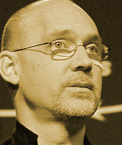- Cloud Platform Storage: Relational vs. Scale-Out
- Why It's Hard for Enterprises to Save Money with C...
- The Sixth Platform
- An Interview on Cloud Computing and Azure
- Upcoming Speaking Schedule
- Introducing Geneva
- A First Look at WF 4.0, Dublin, and Oslo
- Introducing the Azure Services Platform
- What is Oslo?
- Architect Connections Conference
Opinari
# Saturday, March 14, 2009
The Wharton School of Business has created a list of the top 30 innovations in the last 30 years. The complete list is here, but here are the top ten:
- Internet, broadband, WWW (browser and HTML)
- PC/laptop computers
- Mobile phones
- DNA testing and sequencing/Human genome mapping
- Magnetic Resonance Imaging (MRI)
- Microprocessors
- Fiber optics
- Office software (spreadsheets, word processors)
- Non-invasive laser/robotic surgery (laparoscopy)
Notice what they all have in common? Every single one is dependent on software. Some of them, like email, are purely software. Some, like microprocessors, exist solely to run software. And the rest, like mobile phones and MRI, rely heavily on software.
Going deeper into the list doesn't change this. Innovation number 11 is open source software, 14 is GPS systems, 21 is graphical user interfaces, and number 23 is RFIDs. Almost every one of the 30 innovations relies on code in some way.
For anybody who works in software, the takeaway should be clear: We work in the most important profession in the world.
Innovations are what underlie growth in productivity--the ability to do more with less--and productivity growth is what raises everyone's standard of living. Quality improves too, through better medical technology and more. In the most literal sense, the work we do is the most important factor in making the world a better place.
Ever feel like you're just writing another app, just doing technical marketing for another faceless corporation, or just supporting another piece of meaningless code? Don't. Our efforts have been a primary force in improving the world for the last several decades, and this isn't about to stop. All of us who are engaged in software are in fact doing the same thing: We're creating the foundation for a better world.
6 comments :: Post a Comment
Comments:
Perhaps you're working on a project that doesn't leave you feeling like you're moving us forward. If so, it's time to look for a new gig.
I think people often forget how radically productive software has made us. It's almost unimaginable that just 20 years ago the height of tech wizardy for most office workers was an IBM Selectric!
We don't always create the right things, but still, can anybody seriously argue that software hasn't made the world much better?
<< Home



